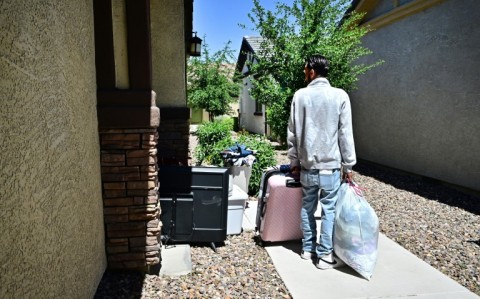PHOENIX - Wearing a bulletproof vest and with a gun strapped to his waist, Constable Lennie McCloskey opens his folder and looks through the court orders: eleven evictions to be carried out today.
"It's a slow day" in Maricopa County, Arizona, he says.
Maricopa is home to Phoenix, one of the fastest-growing cities in the United States, a place where rents have skyrocketed since the start of the Covid-19 pandemic, leaving an ever-increasing number of people in trouble.
"I typically do between 19 and 25 (evictions) a day," said McCloskey, one of 26 such officers in Maricopa.
Much of the United States has seen house prices shoot up in recent years, taking rents with them.
At the same time, wages have not kept pace, making housing an ever-larger proportion of a family's costs.
Simply not being able to afford the rent is one of the main reasons behind the shocking 3,000 evictions that take place in Maricopa County every month -- a place expected to be a key battleground in this November's presidential election between Joe Biden and Donald Trump.
"What's particularly dramatic about Phoenix is how expensive it is and how quickly it's changed," said Glenn Farley of the Common Sense Institute, an economic research firm.

"Five years ago, Phoenix still had a reputation as being relatively affordable; rent was low, housing costs were low. That has pretty much reversed more or less overnight."
Servicing a mortgage in 2019 was viable for someone working an average job for 40 hours a week, he said.
"Today, in 2024 in the greater Phoenix area, you need to work about 68 hours. That's more than 50 percent longer."
- 'It's embarrassing' -
In 19 years of enforcing court orders, McCloskey has seen it all: homes turned into drug warehouses, people who sublet to third parties or leave children in the house alone to avoid eviction, and even a baseball player who had simply abandoned everything in situ.
But what he sees most nowadays is people who haven't been able to scrape together enough money to make the rent that month -- sufficient cause for a landlord to get a court-ordered eviction.
"I've seen guys that are working, trying to work two jobs to keep this going, or they have multiple families live in the house or the apartment... the wages don't compensate the rent," said McCloskey.
That's an observation that is borne out by the numbers, says Farley, who notes that between 2020 and 2022 wages did rise by upwards of 20 percent.
"The trouble is that inflation alone has absorbed that 20 to 30 percent, and housing costs (have risen) more than double that."
Alex, a mechanic in his 30s whom McCloskey had to evict, is a case in point.
"I have two jobs and it's not enough," he told AFP as he moved his belongings out of the two-bedroom house where he lived with his wife, their daughter and pet dog.

"I've worked my whole life (yet) I can't afford to pay the rent. It's ridiculous," he said as he watched two men change the locks of what until then had been his home.
Alex said he was two months behind on his rent -- which came to around $3,000 a month with bills -- when the eviction order came through.
"I don't know how other people do it, but like I said, I've worked my whole life and it's never been this bad," he said.
- 'Endless problem' -
Joe Biden won Arizona by just over 10,000 votes in 2020 and the state is expected to be close again when Americans go to the polls in November.
Many of the issues that are uppermost in voters' minds across the country are particularly acute here -- from immigration to abortion, to the state of the economy.
Some of the blame lies with the pandemic.
With millions able to work from home during lockdowns, people fled pricier real estate markets like California for somewhere with a bit more space.
The increased demand -- and in some cases spare cash generated by the sale of an expensive Californian home -- sent costs up in Phoenix, at a time that house building was stalling, leaving the city with an estimated 65,000-home shortfall.
"You got a surge in demand, a surge in population, a collapse in supply. The result was rapid price increases," said Farley.
That means a boom in work for McCloskey and his colleagues.
"It makes it tougher for people," sighed McCloskey as he got back into his car after delivering bad news to another family.
"It seems like an endless problem."
- by Paula Ramon

